Saturday, February 8, 2025, 9:00 AM - 3:00 PM (Registration starts at 8:30 AM)
Kassandra Center for Educational Excellence, Anatolia College
In the era of Artificial Intelligence, education is called upon to adapt to a rapidly changing world. How can we harness the power of technology without losing the essence of human creativity? What are the possibilities and limitations of integrating AI into educational practices?
This conference offers an open dialogue on the intersection of creativity and artificial intelligence. Through inspiring talks and hands-on workshops, participants will explore ways in which technology can enrich learning, provide new perspectives on teaching, and address the challenges of modern education.
In this context, technology is not merely treated as a tool but as a stimulus for new ideas and practices.
The goal is to highlight how we can leverage artificial intelligence while keeping our pedagogical approach vibrant and meaningful in a world filled with new challenges and exciting opportunities.
The event is aimed at educators of all levels and disciplines, students, researchers, and members of the educational community.
Participants will receive a certificate of attendance.
Parking will be available.
Register here
Schedule of the day
08:30-09:00 Arrival/Registration & Morning Coffee
09:00-09:15 Welcome
09:15-10:15 Talk by Dr. Zoi Philippakos
10:15-10:35 Talk by Dr. Eleni Katsarou
10:35-11:00 Questions - Discussion
11:00-11:10 Presentation of 9 workshops
11:10-11:30 Coffee break
11:30-13:00 Workshops: 1st part
13:00-13:30 Lunch break
13:30-15:00 Workshops: 2nd part
Speakers
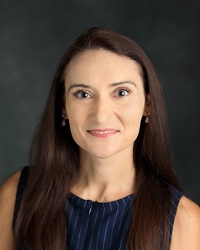 Developing learning strategies - Applications and Implications of AI in Education
Developing learning strategies - Applications and Implications of AI in Education
Dr. Zoi Philippakos, Associate Professor, College of Education, University of Tennessee, Knoxville, United States
Dr. Filippakos will present writing instruction strategies based on the characteristics of writing genres (organization/structure, syntax, linguistic features). Additionally, she will explore the connection between writing and reading, as well as how writing and reading activities tied to reading materials can enhance writing, comprehension, and critical thinking when integrated into the curriculum. She will also highlight the challenges and opportunities arising from Artificial Intelligence, along with specific tools that can be utilized in teaching to strengthen critical thinking, support differentiated instruction, empower students’ critical thinking skills, and expand educators’ options for teaching materials.
Biography:
Dr. Zoe A. Traga Philippakos is an Associate Professor at the University of Tennessee, Knoxville, where she directs the Literacy Specialist Program. She holds a Master’s degree as a Reading Specialist and a Ph.D. in writing instruction from the University of Delaware. She has worked as an elementary school teacher and as a faculty member at universities such as Towson University and UNC Charlotte. Her research interests include the teaching of writing and reading in K-12 and higher education, self-regulated strategy instruction, fostering learning motivation, and professional development for teachers.
Dr. Philippakos co-developed the programs Developing Strategic Writers and Big Words Program, which focus on strategic writing instruction and decoding multisyllabic words, respectively. She also conducts research on the use of Artificial Intelligence in writing instruction in secondary education, with a particular focus on issues such as assessment and revision.
She has received awards such as the Outstanding Early Career Award from the Literacy Research Association (2019) and the University of Tennessee’s Outstanding Research Award (2021). Dr. Philippakos is the author of books including Developing Strategic Writers and Writing Instruction for Success in College and in the Workplace, and her articles have been published in leading academic journals. She serves on the Board of Directors of the International Literacy Association and advocates for research-based practices. More information is available on her website.
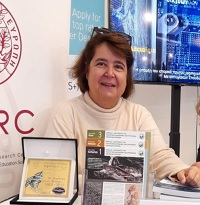 Artificial Intelligence and Education: Research, Teaching, and AI Literacy
Artificial Intelligence and Education: Research, Teaching, and AI Literacy
Dr. Eleni Katsarou
Professor of Curriculum Theory and Didactics,
Department of Primary Education, University of Crete
This presentation focuses on a critical question: To what extent can artificial intelligence (AI) technologies help us think more deeply and critically? Can they enhance our thinking, education, and, consequently, knowledge and learning, which are fundamental components of education? Specifically, the discussion will address three key questions:
a) Can AI serve, enhance, and create new prospects for scientific research in the social sciences, particularly in educational research?
b) Can AI be utilized in teaching and assessing, especially in the humanities and social sciences, to cultivate critical and transformative thinking among educators and learners?
c) How can we, as citizens, gain a profound awareness of how AI and its tools operate, the ways they influence our daily lives, our thinking, and our behavior? In other words, how can we acquire literacy in AI?
The presentation is structured around these three questions, with each forming a distinct section. In each part, the opportunities that AI brings to the broader field of education will be examined, along with the challenges and obstacles it presents, as well as the potential risks associated with its use—particularly when applied uncritically.
Biography:
Eleni Katsarou is a Professor of Curriculum Theory and Didactics in the Department of Primary Education at the University of Crete. Her research and publications focus on teaching theory, educational research (particularly action research), and issues of literacy and teaching Modern Greek within the framework of New Literacy Studies. She is the (co-)author of numerous educational materials taught in secondary schools in Greece, three scholarly books addressing action research, critical literacy, and democracy in schools, and more than 60 articles published in international and Greek journals and edited volumes. Additionally, she has (co-)edited three collective volumes on multimodality in education and action research.
Currently, she is involved in six research projects (four European and two national). Her recent work explores the complex concepts of critical digital literacy and AI literacy. She is a member of the research team for the European project TALOS – Artificial Intelligence for Social Sciences and Humanities (ERA Chairs HORIZON-WIDERA-2022-TALENTS-01), where she is responsible for investigating the potential of artificial intelligence in education.
Workshops
The workshops will be three hours long and will be held in parallel, so there is room to participate in only one workshop. In the registration form, please select only one workshop. Please note that workshops 1 to 8 will be conducted in Greek. Workshop 9 will be conducted in English.
Register here
1. Application and Utilization of Artificial Intelligence Tools in Lesson Plans for Primary School Teachers and Students
Presenter: Nikos Amanatidis
Artificial Intelligence (AI) has the potential to enhance teaching, learning, and administration in education by offering more personalized, differentiated, and adaptive learning and teaching experiences. The workshop "Application and Utilization of AI Tools in Lesson Plans" is designed for primary school teachers, focusing on the use of educational platforms, adaptive learning applications, and assessment systems. Through interactive activities, educators will learn how to integrate AI into daily teaching, fostering greater interaction with students. Additionally, the workshop will address challenges, privacy protection, and ethical considerations, aiming for the responsible use of AI.
 Nikolaos Amanatidis is an Education Consultant for Primary Education in Eastern Thessaloniki and a trainer of adults in new technologies and innovative pedagogical practices. He is a former teacher and principal of the Experimental Primary School of Thessaloniki, affiliated with Aristotle University. He has also served as a coordinator and evaluator of European programs, including Horizon and Erasmus, and is a Fulbright Foundation scholar.
Nikolaos Amanatidis is an Education Consultant for Primary Education in Eastern Thessaloniki and a trainer of adults in new technologies and innovative pedagogical practices. He is a former teacher and principal of the Experimental Primary School of Thessaloniki, affiliated with Aristotle University. He has also served as a coordinator and evaluator of European programs, including Horizon and Erasmus, and is a Fulbright Foundation scholar.
With over 30 years of experience in education and training in innovative technologies, he maintains close contact with educators and organizers promoting technology-driven initiatives in Greece, the European Union, and globally. He collaborates with experts and policymakers in education from the United States, Europe, and the United Kingdom.
2. Artificial Intelligence in the Educational Process: Recent Developments, Future Challenges, and Legal Dimensions
Presenter: Dr. Elina Asimakopoulou
This seminar focuses on the core principles of the AI Act Regulation (2024) and the application of artificial intelligence (AI) in education, with an emphasis on fundamental human rights. It explores European policies, such as the Digital Education Action Plan (2021-2027) and UNESCO guidelines. Participants will become familiar with the boundaries of the human-centric approach to AI, the lawful use of data, the parameters for creating educational content, and the ethical challenges associated with AI. Initiatives like the AI Alliance will be presented, highlighting lawful and ethical AI usage, alongside legal and philosophical perspectives.
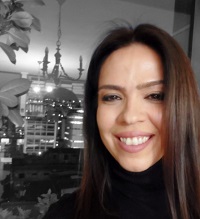 Dr. Evangelia (Elina) Asimakopoulou, a lawyer based in Thessaloniki, holds a Ph.D. in Law from Aristotle University of Thessaloniki (2017) and teaches Civil Procedure and Labor Law at Neapolis University Pafos. She has earned two master’s degrees and received a postdoctoral fellowship from the Max Planck Institute. She is the author of four monographs and has published over 50 articles in Greek and international journals. With participation in more than 30 conferences, she organizes scientific lectures and is a regular speaker at training seminars of the National School of Judges, specializing in Procedural Law and Competition Law.
Dr. Evangelia (Elina) Asimakopoulou, a lawyer based in Thessaloniki, holds a Ph.D. in Law from Aristotle University of Thessaloniki (2017) and teaches Civil Procedure and Labor Law at Neapolis University Pafos. She has earned two master’s degrees and received a postdoctoral fellowship from the Max Planck Institute. She is the author of four monographs and has published over 50 articles in Greek and international journals. With participation in more than 30 conferences, she organizes scientific lectures and is a regular speaker at training seminars of the National School of Judges, specializing in Procedural Law and Competition Law.
3. Artificial Intelligence in Education: Technological Revolution or Opportunity for Reflection?
Presenter: Vasilis Economou
This seminar explores the impact of artificial intelligence (AI) applications in education, such as chatbots, and encourages participants to view new technologies as an opportunity for innovation. Practical examples of AI use are presented, such as course design, creation of questions, assessment tests, historical narratives and plays, text illustration, and animation development. The concept of the "digital assistant" is discussed, which facilitates the work of educators and inspires new ideas. Participants will learn how to combine technology and pedagogy, creating creative tools and educational materials with the help of AI.
 Vasilis Economou is an IT Consultant at the Greek Foundation for Culture and a former Director of Information Technology at Athens College. He worked at the Dukes Educational Institution (1994-2020), promoting the integration of the Student Computer. He has been recognized in many international competitions and has been named a Microsoft Expert Educator and Microsoft Fellow. He has participated in over 50 research projects and developed more than 80 software titles. He specializes in ICT, the "1:1" method, Mixed Reality, and interactive surfaces. His vision is to involve as many students, educators, and parents as possible in the utilization of technology in education.
Vasilis Economou is an IT Consultant at the Greek Foundation for Culture and a former Director of Information Technology at Athens College. He worked at the Dukes Educational Institution (1994-2020), promoting the integration of the Student Computer. He has been recognized in many international competitions and has been named a Microsoft Expert Educator and Microsoft Fellow. He has participated in over 50 research projects and developed more than 80 software titles. He specializes in ICT, the "1:1" method, Mixed Reality, and interactive surfaces. His vision is to involve as many students, educators, and parents as possible in the utilization of technology in education.
4. Utilizing ChatGPT in Instructional Design for Science Education in Primary Schools: Opportunities and Challenges
Presenter: Dr. Giorgos Peikos
This workshop is aimed towards primary education teachers.
The workshop aims to support primary school educators in the responsible use of ChatGPT for instructional design in Science Education. Initially, the workshop will present key theoretical frameworks from Science Education, such as Pedagogical Content Knowledge, and introduce ChatGPT as a tool to support the educational process. Following that, participants will explore through practical examples how these theoretical frameworks can be used to create prompts for ChatGPT, with the goal of developing lesson plans. Special emphasis will be placed on critical evaluation of the generated lesson plans.
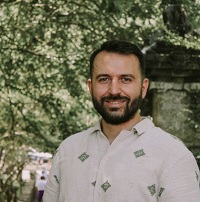 Giorgos Peikos is a teacher and postdoctoral researcher at the University of Crete, with a focus on Productive Artificial Intelligence and Science Education. He holds a PhD from the University of Western Macedonia and has published articles, book chapters, and a Greek-language book. His research focuses on teaching Nanotechnology in primary schools and the use of modern technologies in Science Education. He has taught Science Education courses at both undergraduate and graduate levels at the University of Western Macedonia and Aristotle University of Thessaloniki. The following link leads to his published work: https://www.researchgate.net/profile/Giorgos-Peikos
Giorgos Peikos is a teacher and postdoctoral researcher at the University of Crete, with a focus on Productive Artificial Intelligence and Science Education. He holds a PhD from the University of Western Macedonia and has published articles, book chapters, and a Greek-language book. His research focuses on teaching Nanotechnology in primary schools and the use of modern technologies in Science Education. He has taught Science Education courses at both undergraduate and graduate levels at the University of Western Macedonia and Aristotle University of Thessaloniki. The following link leads to his published work: https://www.researchgate.net/profile/Giorgos-Peikos
5. Reading Strategies in the Age of Misinformation: Fake News and Recognition Practices
Presenter: Dr. Konstantinos Sipitanos
This workshop addresses the challenge of misinformation. It aims to enhance teachers' skills to educate students as critical readers. Through practical activities, educators will learn how to guide students in evaluating information, analyzing texts, and using specific criteria, such as reliability and objectivity. The goals of the workshop include fostering critical thinking and enhancing reading awareness. The program is aimed at teachers who seek to equip their students against fake news.
The action is implemented within the framework of Erasmus+: S.H.I.E.L.D. against Disinformation. For more information: https://shieldvsdisinfo.com.
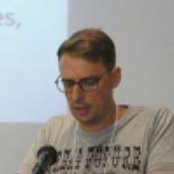 Konstantinos Sipitanos is an educator-researcher and postdoctoral researcher at the University of Crete. He holds a master's degree in Linguistics (2016) and a PhD (2020) in Language Teaching and Participatory Action Research Methodology. He has worked as a researcher and teaching staff member in the Departments of Philosophy and Social Sciences at the University of Crete, the Department of Early Childhood Education at the University of Athens, and the Master’s program in Contemporary Linguistic Trends for Educators at the Hellenic Open University. He has published articles and chapters in collective volumes, international scientific journals, and renowned publishing houses. He has also participated in research projects funded by the European Union under the Erasmus+ program and by national organizations.
Konstantinos Sipitanos is an educator-researcher and postdoctoral researcher at the University of Crete. He holds a master's degree in Linguistics (2016) and a PhD (2020) in Language Teaching and Participatory Action Research Methodology. He has worked as a researcher and teaching staff member in the Departments of Philosophy and Social Sciences at the University of Crete, the Department of Early Childhood Education at the University of Athens, and the Master’s program in Contemporary Linguistic Trends for Educators at the Hellenic Open University. He has published articles and chapters in collective volumes, international scientific journals, and renowned publishing houses. He has also participated in research projects funded by the European Union under the Erasmus+ program and by national organizations.
6. Social Assistance Robots in Supporting Special Education Professionals
Presenter: Dr. Nikos Fahanidis
This workshop is aimed at special education professionals.
The workshop focuses on the use of social assistance robots in special education, highlighting their potential in education. Participants will be introduced to the Daisy robot, developed by the LIRES lab at the University of Macedonia, and will engage in interactive activities. They will see application examples, experiment with the Daisy app on Android devices, and explore questions regarding the role, capabilities, and challenges of robots in special education. Through a balance of theory and practice, the workshop aims to inspire and equip participants with tools and ideas that can be immediately integrated into their professional routines.
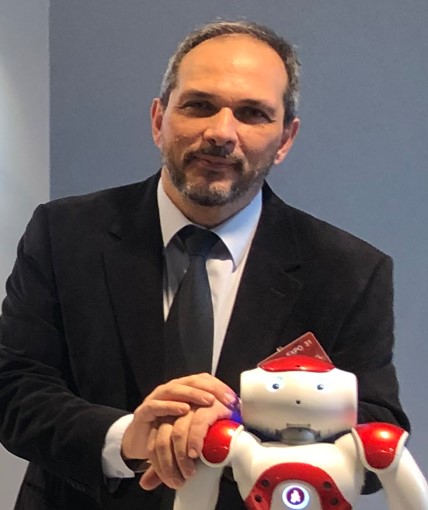 Nikos Fahanidis, professor at the University of Macedonia, is the founder and scientific supervisor of the University of Macedonia’s Robotics Academy. He is the director of the research laboratory for Applications of Informatics and Robotics in Education and Society and the director of the MSc program "Education Sciences: Applications of Information and Communication Technologies in Education and Lifelong Learning."
Nikos Fahanidis, professor at the University of Macedonia, is the founder and scientific supervisor of the University of Macedonia’s Robotics Academy. He is the director of the research laboratory for Applications of Informatics and Robotics in Education and Society and the director of the MSc program "Education Sciences: Applications of Information and Communication Technologies in Education and Lifelong Learning."
He was the first to introduce Educational Robotics in a curriculum of a Greek university’s Pedagogical Department and has been working with his team on the creation and development of social assistance robots. He has implemented projects using robotics for the social and emotional support of students and special groups. The Daisy robot and the ARRoW method represent a case of turning research into practical applications that support children on the autism spectrum to improve their social skills, as well as their professionals and family members in supporting them.
7. Utilizing Digital Tools to Foster Creativity Skills
Presenter: Dr. Sofia Haskou
The integration of new technologies in education is crucial for improving teaching and learning. In this workshop, educators will combine theoretical approaches with digital tools to promote skills such as creativity, critical thinking, collaboration, and communication. They will experiment with artificial intelligence tools and digital applications, such as crosswords, word clouds, puzzles, mind maps, songs, and interactive videos. Participants will explore how these specific tools can enhance teaching practices, improve student skills, and ensure active participation in the learning process.
 Sofia Haskou is a teacher and a doctor of the University of Athens. She serves as an Education Consultant for Teachers. With extensive teaching experience, she has participated in research projects focusing on the teaching process and education, with particular emphasis on the integration of new technologies in learning. She holds postgraduate degrees in Special Education and Educational Technologies, and her doctoral studies focus on creativity and high intelligence in school-age students.
Sofia Haskou is a teacher and a doctor of the University of Athens. She serves as an Education Consultant for Teachers. With extensive teaching experience, she has participated in research projects focusing on the teaching process and education, with particular emphasis on the integration of new technologies in learning. She holds postgraduate degrees in Special Education and Educational Technologies, and her doctoral studies focus on creativity and high intelligence in school-age students.
8. Artificial Intelligence in Primary Education: Opportunities, Tools, and Challenges
Presenter: Dr. Savvas Chatzichristofis
Artificial intelligence is opening new paths in teaching and learning, transforming primary education. In this presentation, we will explore how AI can enrich lesson plans, adapt teaching to the needs of students, and enhance participation. Through practical examples and collaborative lesson plan creation, we will highlight both the opportunities and challenges of this technology, ensuring a balanced and responsible use in the classroom.
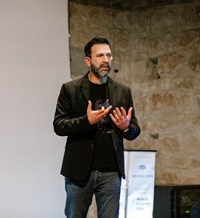 Savvas Chatzichristofis is the Vice-Rector for Research and Innovation and a Professor of Artificial Intelligence at Neapolis University Pafos, Cyprus. His research focuses on the intersection of artificial intelligence, computer vision, and robotics, and he has participated in numerous R&D projects funded by European and national organizations. He holds a Master's degree (M.Eng.) and a PhD in Computer Vision from Democritus University and has served as a specialist scientist, visiting professor, and researcher at various institutions. He has received numerous distinctions, scholarships, and awards for his contributions and has published extensively in prestigious academic journals.
Savvas Chatzichristofis is the Vice-Rector for Research and Innovation and a Professor of Artificial Intelligence at Neapolis University Pafos, Cyprus. His research focuses on the intersection of artificial intelligence, computer vision, and robotics, and he has participated in numerous R&D projects funded by European and national organizations. He holds a Master's degree (M.Eng.) and a PhD in Computer Vision from Democritus University and has served as a specialist scientist, visiting professor, and researcher at various institutions. He has received numerous distinctions, scholarships, and awards for his contributions and has published extensively in prestigious academic journals.
9. AI Tools for Teachers (Workshop in English)
Presenter: Claudia Meirinhos
The importance of artificial intelligence (AI) in today's and tomorrow's world is increasingly evident, as AI is transforming our lives. In education, AI is already beginning to revolutionize teaching by personalizing learning, providing immediate feedback and facilitating access to knowledge. AI tools can adapt content to students' individual needs, support teachers with administrative tasks and create more inclusive and dynamic learning environments. Generative AI, for example, enables the rapid and innovative creation of educational materials.
In this context, it is essential that teachers develop AI literacy, that they understand how these technologies work, their potential and their limits. This competence will enable educators to use AI critically and creatively, better preparing students for the digital future.
"AI tools for teachers" workshop:
- The importance of AI in today's world;
- Reflection on the importance of AI literacy;
- Generative AI and Education;
- General principles of Generative AI for teachers;
- Practical exploration of various AI tools for teachers.
 Cláudia Meirinhos has been a primary school teacher for more than 20 years in Portugal. She has a Master Degree in "ICT in teaching and training" and is a certified teacher’s trainer. She has published an ebook about AI in Primary School, with a case study that implemented an AI curricular unit to develop the AI literacy of primary school students, with very positive results. She is also the author of the "EcoKids teach AI" project, exhibited at the international Science on Stage 2024 Festival, in Turku, Finland, where students learnt about separating waste for recycling and then trained AI to do the same.
Cláudia Meirinhos has been a primary school teacher for more than 20 years in Portugal. She has a Master Degree in "ICT in teaching and training" and is a certified teacher’s trainer. She has published an ebook about AI in Primary School, with a case study that implemented an AI curricular unit to develop the AI literacy of primary school students, with very positive results. She is also the author of the "EcoKids teach AI" project, exhibited at the international Science on Stage 2024 Festival, in Turku, Finland, where students learnt about separating waste for recycling and then trained AI to do the same.
Λίγα Λόγια για το Kassandra Center for Educational Excellence
Το Kassandra Center for Educational Excellence (CEE) - το Κέντρο Εκπαιδευτικής Αριστείας του Κολλεγίου Ανατόλια - φιλοδοξεί να γίνει σημείο αναφοράς και πηγή αριστείας για την εκπαίδευση τόσο του εκπαιδευτικού ιδρύματος του Κολλεγίου Ανατόλια όσο και της ευρύτερης ακαδημαϊκής κοινότητας. Σκοπός του είναι να ενδυναμώσει και να υποστηρίξει τους εκπαιδευτικούς μέσα από καινοτόμες διδακτικές προσεγγίσεις και στρατηγικές που βασίζονται στην εκπαιδευτική έρευνα και τις αναδυόμενες προόδους της, οι οποίες περιλαμβάνουν τόσο την ακαδημαϊκή εξέλιξη όσο και την κοινωνικο-συναισθηματική ανάπτυξη των μαθητών.

 Developing learning strategies - Applications and Implications of AI in Education
Developing learning strategies - Applications and Implications of AI in Education Artificial Intelligence and Education: Research, Teaching, and AI Literacy
Artificial Intelligence and Education: Research, Teaching, and AI Literacy
 Nikolaos Amanatidis is an Education Consultant for Primary Education in Eastern Thessaloniki and a trainer of adults in new technologies and innovative pedagogical practices. He is a former teacher and principal of the Experimental Primary School of Thessaloniki, affiliated with Aristotle University. He has also served as a coordinator and evaluator of European programs, including Horizon and Erasmus, and is a Fulbright Foundation scholar.
Nikolaos Amanatidis is an Education Consultant for Primary Education in Eastern Thessaloniki and a trainer of adults in new technologies and innovative pedagogical practices. He is a former teacher and principal of the Experimental Primary School of Thessaloniki, affiliated with Aristotle University. He has also served as a coordinator and evaluator of European programs, including Horizon and Erasmus, and is a Fulbright Foundation scholar. Dr. Evangelia (Elina) Asimakopoulou, a lawyer based in Thessaloniki, holds a Ph.D. in Law from Aristotle University of Thessaloniki (2017) and teaches Civil Procedure and Labor Law at Neapolis University Pafos. She has earned two master’s degrees and received a postdoctoral fellowship from the Max Planck Institute. She is the author of four monographs and has published over 50 articles in Greek and international journals. With participation in more than 30 conferences, she organizes scientific lectures and is a regular speaker at training seminars of the National School of Judges, specializing in Procedural Law and Competition Law.
Dr. Evangelia (Elina) Asimakopoulou, a lawyer based in Thessaloniki, holds a Ph.D. in Law from Aristotle University of Thessaloniki (2017) and teaches Civil Procedure and Labor Law at Neapolis University Pafos. She has earned two master’s degrees and received a postdoctoral fellowship from the Max Planck Institute. She is the author of four monographs and has published over 50 articles in Greek and international journals. With participation in more than 30 conferences, she organizes scientific lectures and is a regular speaker at training seminars of the National School of Judges, specializing in Procedural Law and Competition Law. Vasilis Economou is an IT Consultant at the Greek Foundation for Culture and a former Director of Information Technology at Athens College. He worked at the Dukes Educational Institution (1994-2020), promoting the integration of the Student Computer. He has been recognized in many international competitions and has been named a Microsoft Expert Educator and Microsoft Fellow. He has participated in over 50 research projects and developed more than 80 software titles. He specializes in ICT, the "1:1" method, Mixed Reality, and interactive surfaces. His vision is to involve as many students, educators, and parents as possible in the utilization of technology in education.
Vasilis Economou is an IT Consultant at the Greek Foundation for Culture and a former Director of Information Technology at Athens College. He worked at the Dukes Educational Institution (1994-2020), promoting the integration of the Student Computer. He has been recognized in many international competitions and has been named a Microsoft Expert Educator and Microsoft Fellow. He has participated in over 50 research projects and developed more than 80 software titles. He specializes in ICT, the "1:1" method, Mixed Reality, and interactive surfaces. His vision is to involve as many students, educators, and parents as possible in the utilization of technology in education. Giorgos Peikos is a teacher and postdoctoral researcher at the University of Crete, with a focus on Productive Artificial Intelligence and Science Education. He holds a PhD from the University of Western Macedonia and has published articles, book chapters, and a Greek-language book. His research focuses on teaching Nanotechnology in primary schools and the use of modern technologies in Science Education. He has taught Science Education courses at both undergraduate and graduate levels at the University of Western Macedonia and Aristotle University of Thessaloniki. The following link leads to his published work:
Giorgos Peikos is a teacher and postdoctoral researcher at the University of Crete, with a focus on Productive Artificial Intelligence and Science Education. He holds a PhD from the University of Western Macedonia and has published articles, book chapters, and a Greek-language book. His research focuses on teaching Nanotechnology in primary schools and the use of modern technologies in Science Education. He has taught Science Education courses at both undergraduate and graduate levels at the University of Western Macedonia and Aristotle University of Thessaloniki. The following link leads to his published work:  Konstantinos Sipitanos is an educator-researcher and postdoctoral researcher at the University of Crete. He holds a master's degree in Linguistics (2016) and a PhD (2020) in Language Teaching and Participatory Action Research Methodology. He has worked as a researcher and teaching staff member in the Departments of Philosophy and Social Sciences at the University of Crete, the Department of Early Childhood Education at the University of Athens, and the Master’s program in Contemporary Linguistic Trends for Educators at the Hellenic Open University. He has published articles and chapters in collective volumes, international scientific journals, and renowned publishing houses. He has also participated in research projects funded by the European Union under the Erasmus+ program and by national organizations.
Konstantinos Sipitanos is an educator-researcher and postdoctoral researcher at the University of Crete. He holds a master's degree in Linguistics (2016) and a PhD (2020) in Language Teaching and Participatory Action Research Methodology. He has worked as a researcher and teaching staff member in the Departments of Philosophy and Social Sciences at the University of Crete, the Department of Early Childhood Education at the University of Athens, and the Master’s program in Contemporary Linguistic Trends for Educators at the Hellenic Open University. He has published articles and chapters in collective volumes, international scientific journals, and renowned publishing houses. He has also participated in research projects funded by the European Union under the Erasmus+ program and by national organizations.
 Nikos Fahanidis, professor at the University of Macedonia, is the founder and scientific supervisor of the University of Macedonia’s Robotics Academy. He is the director of the research laboratory for Applications of Informatics and Robotics in Education and Society and the director of the MSc program "Education Sciences: Applications of Information and Communication Technologies in Education and Lifelong Learning."
Nikos Fahanidis, professor at the University of Macedonia, is the founder and scientific supervisor of the University of Macedonia’s Robotics Academy. He is the director of the research laboratory for Applications of Informatics and Robotics in Education and Society and the director of the MSc program "Education Sciences: Applications of Information and Communication Technologies in Education and Lifelong Learning." Sofia Haskou is a teacher and a doctor of the University of Athens. She serves as an Education Consultant for Teachers. With extensive teaching experience, she has participated in research projects focusing on the teaching process and education, with particular emphasis on the integration of new technologies in learning. She holds postgraduate degrees in Special Education and Educational Technologies, and her doctoral studies focus on creativity and high intelligence in school-age students.
Sofia Haskou is a teacher and a doctor of the University of Athens. She serves as an Education Consultant for Teachers. With extensive teaching experience, she has participated in research projects focusing on the teaching process and education, with particular emphasis on the integration of new technologies in learning. She holds postgraduate degrees in Special Education and Educational Technologies, and her doctoral studies focus on creativity and high intelligence in school-age students.
 Savvas Chatzichristofis is the Vice-Rector for Research and Innovation and a Professor of Artificial Intelligence at Neapolis University Pafos, Cyprus. His research focuses on the intersection of artificial intelligence, computer vision, and robotics, and he has participated in numerous R&D projects funded by European and national organizations. He holds a Master's degree (M.Eng.) and a PhD in Computer Vision from Democritus University and has served as a specialist scientist, visiting professor, and researcher at various institutions. He has received numerous distinctions, scholarships, and awards for his contributions and has published extensively in prestigious academic journals.
Savvas Chatzichristofis is the Vice-Rector for Research and Innovation and a Professor of Artificial Intelligence at Neapolis University Pafos, Cyprus. His research focuses on the intersection of artificial intelligence, computer vision, and robotics, and he has participated in numerous R&D projects funded by European and national organizations. He holds a Master's degree (M.Eng.) and a PhD in Computer Vision from Democritus University and has served as a specialist scientist, visiting professor, and researcher at various institutions. He has received numerous distinctions, scholarships, and awards for his contributions and has published extensively in prestigious academic journals. Cláudia Meirinhos has been a primary school teacher for more than 20 years in Portugal. She has a Master Degree in "ICT in teaching and training" and is a certified teacher’s trainer. She has published an ebook about AI in Primary School, with a case study that implemented an AI curricular unit to develop the AI literacy of primary school students, with very positive results. She is also the author of the "EcoKids teach AI" project, exhibited at the international Science on Stage 2024 Festival, in Turku, Finland, where students learnt about separating waste for recycling and then trained AI to do the same.
Cláudia Meirinhos has been a primary school teacher for more than 20 years in Portugal. She has a Master Degree in "ICT in teaching and training" and is a certified teacher’s trainer. She has published an ebook about AI in Primary School, with a case study that implemented an AI curricular unit to develop the AI literacy of primary school students, with very positive results. She is also the author of the "EcoKids teach AI" project, exhibited at the international Science on Stage 2024 Festival, in Turku, Finland, where students learnt about separating waste for recycling and then trained AI to do the same.